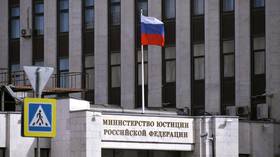Russia poised to ban investigative news site ‘Proekt’ as ‘undesirable organization’ as journalists handed ‘foreign agent’ label

The Russian Ministry of Justice has designated eight journalists, including one working for US state media, as ‘foreign agents,’ with officials banning an online news publication as ‘undesirable,’ after police raided its offices.
Authorities announced on Thursday that the label would apply to the reporters with immediate effect, representing the single greatest expansion in the list of individual ‘foreign agents.’ Prior to the ruling, only three journalists had been so designated over their links to overseas funding. Those given the designation are required to display their status as part of any publications, as well as comply with specific financial reporting requirements.
Among those handed the tag are an employee of online news site Open Media and a correspondent for US state-run media RFERL, which is already designated as a ‘foreign agent’ itself. Six staff members of internet-based investigations outlet Proekt, which translates as ‘The Project,’ were also listed.
Also on rt.com Russian authorities search apartments of investigative journalists & their family members over 2017 libel accusations – lawyersIn addition, prosecutors revealed that Proekt would be designated as an ‘undesirable organization,’ effectively banning it from operating in Russia and limiting the extent to which others can republish or cite its work. The site had become known for gotcha-style investigations, including those about a woman it alleges is the secret daughter of President Vladimir Putin. It has also published a report on the real-estate interests of Prime Minister Mikhail Mishustin.
In addition, the site has published probes into the personal finances of the head of Russia’s Chechnya region. The outlet's staff have won several rewards for their reporting and investigations.
Proekt's finances have been the subject of speculation, given it is said to have significant sums available for payroll and special projects. The European Endowment for Democracy, an EU non-governmental organization, is said to be a significant funding partner for the group. It describes itself as supporting civic and political activists working towards putting in place what it deems to be "pluralistic, democratic" governments and systems, while emphasizing the importance of non-violent change.
The law forbids groups given the designation from opening offices or disseminating materials in the country. Those found to be affiliated with them can face fines of up to 100,000 rubles (around $1,370) or prison terms of two to six years.
Last month, police reportedly raided the homes of several reporters working for the site after a wealthy businessman brought a libel case against the group. Staff members were said to have been taken in for questioning.
Organizations and individuals who fall afoul of the requirements under the foreign agent law can also face hefty fines and even jail time. RFERL, funded by the US taxpayer and run by Washington, has been hit with dozens of financial penalties for refusing to comply with the law.
Putin has previously said that the law does not prevent anyone from working, but simply ensures that Russians understand that foreign sources may have influenced the content that they are reading or watching. “What’s wrong with the foreign agent status? We’re not the ones who came up with it,” he asked in an interview last year, saying that it was a reaction to an equivalent law that “has been in effect in the US since 1937 or 1938 and still is.”
The president went on to say that “nobody’s rights are being infringed on here whatsoever. There is nothing that runs counter to international practice.”
Think your friends would be interested? Share this story!













